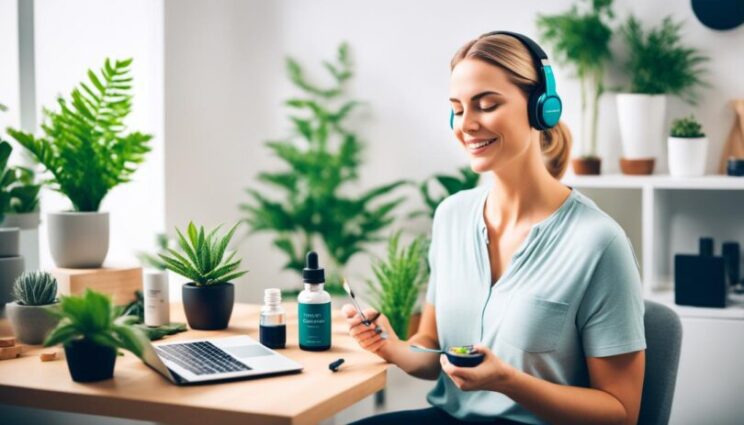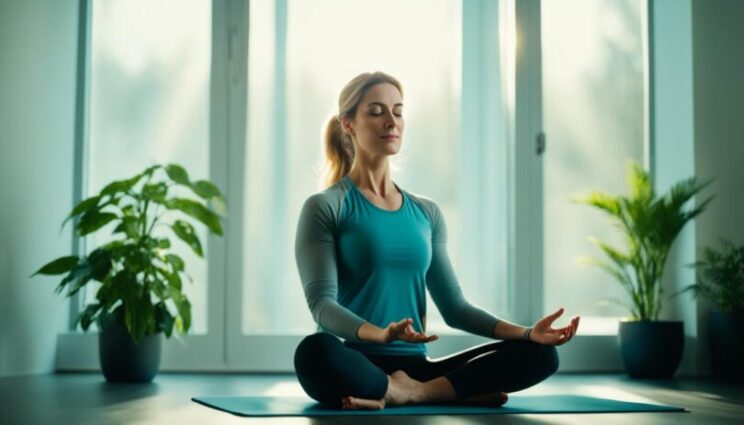Do you sometimes wonder how people stay calm when faced with stress and anxiety? Guided Meditation for Anxiety could hold the key. In our world today, dealing with anxiety is important. Practices like guided meditation are now crucial for finding peace and staying emotionally stable.
Guided meditation isn’t just popular, it’s proven to work in science. Methods like Mindfulness-Based Stress Reduction (MBSR) offer real help, even for those with severe anxiety. A study in 2014 found that such programs can significantly lower anxiety and depression.
If you’re new to meditation or tried it before, guided meditation might be your next step. It can lead you to a calm and balanced life. So, why not try guided meditation? It could change how you deal with stress and anxiety.
Key Takeaways
- Guided meditation is a structured relaxation practice tailored to reducing anxiety.
- MBSR can significantly alleviate symptoms of anxiety and panic disorders.
- Mindfulness meditation programs can reduce anxiety and depression.
- Combining MBCT with medication tapering can be effective for mood and anxiety disorders.
- Guided meditation helps foster emotional balance and inner peace.
Introduction to Guided Meditation for Anxiety
Guided meditation is a light in the dark for those with anxiety. It uses mindfulness as the central idea. These anxiety relief techniques aim to bring peace and a calm mind through methodical sessions.
Mindfulness-Based Stress Reduction (MBSR) is at the core of these stress management tools. It’s an eight-week program created by the American Journal of Psychiatry in 1992. This approach has been shown to lower anxiety and panic attack symptoms for people with general or panic disorders.
There’s strong evidence for its success. A 2014 study in JAMA Internal Medicine reported these programs help reduce anxiety and depression. This supports the use of these methods for anxiety relief.
Guided meditation also includes Mindfulness-Based Cognitive Therapy (MBCT). It has proven successful. For those with recurrent depression, it cut the risk of depression returning by half. Two key studies from 2000 and 2008 in The Journal of Consulting and Clinical Psychology supported this. What’s more, a study in The Lancet in 2015 found MBCT to be as effective without medication as medication maintenance to avoid depression.
Meditation isn’t just good for depression and anxiety. It also makes you sharper. A small University of Waterloo study showed it boosts attention and task performance. It does this by shifting focus from internal thoughts to what’s outside. This not only helps with anxiety. It also makes you feel more in tune with the present.
In the end, guided meditation is like a rich pattern of healing. It wraps together several techniques for relief. By using these practices, people can better handle stress. They can invite peace into their everyday lives.
Understanding Anxiety and Its Effects
Anxiety affects about 19% of U.S. adults. Sadly, over 60% don’t get help. It’s crucial to know the effects of anxiety on body and mind. It can lead to stress, trouble sleeping, and feeling drained.

One way to lessen anxiety’s grip is through mindful activities like meditation. Study shows meditation for mental health is as good as drugs for anxiety. For example, Transcendental Meditation (TM) lowers anxiety and exhaustion in healthcare workers.
Regular meditation might very quickly improve mental health. Within weeks to months, people see a difference. A 6-week meditation program, Isha Kriya, cut down depression and anxiety symptoms after just two weeks.
Guided meditations are easy to find, often for free. Visit Goodful, Headspace, or Ten Percent Happier for meditation for anxiety. They offer tools to start feeling better with daily practices.
MBSR and MBCT are two helpful programs. MBSR in 8 weeks and MBCT cuts depression return rates by half. These are backed by solid research.
A big study in 2014 supported mindfulness helping with anxiety and depression. The study had 47 trials with over 3,500 people. The effect was clear: mindfulness boosts focus and reduces stress and anxiety.
Benefits of Guided Meditation for Anxiety
Guided meditation is key in fighting anxiety. It brings a wide range of benefits for both body and mind. Meditating often helps us feel better and gets our minds in shape.
Physical Benefits
Guided meditation can improve our bodies too. It lowers stress hormones, easing anxiety. A 1992 study in the American Journal of Psychiatry found that Mindfulness-Based Stress Reduction lessens anxiety and panic.
It also helps lower blood pressure, reducing the risk of heart disease. Plus, it boosts sleep by making it easier to fall asleep and improving rest quality.
Mental and Emotional Benefits
Meditation also does wonders for our minds and hearts. A 2014 study in JAMA Internal Medicine showed it cuts anxiety and depression levels. Mindfulness-Based Cognitive Therapy prevents 50% of depression relapses, says the Journal of Consulting and Clinical Psychology.
It’s great at managing stress too. It cuts out overthinking, making us emotionally stronger. The Lancet found that MBCT, with a lessening in medication, is as good as meds for preventing depression again.
These practices help us deal with stress and become more self-aware. They also teach us to focus on the moment, leading to a calmer, balanced mind.
How Guided Meditation Works
Guided meditation uses mindfulness exercises to boost focus and awareness. This leads to great meditation benefits. A 2014 study in JAMA Internal Medicine found that it lessens anxiety and depression. This comes from 47 studies with 3,515 people.

It helps keep the mind centered, moving focus from stress to calm. Mindfulness-Based Cognitive Therapy (MBCT) has cut depression relapse by half for some people. This was shown in the Journal of Consulting and Clinical Psychology. The Lancet study noted MBCT combined with stopping medication is effective.
Doing these exercises regularly changes brain patterns. A University of Waterloo study found 10 minutes of mindfulness reduces overthinking. This led to better focus and work. These meditation benefits highlight their key role in mental health.
Guided meditation deeply helps 19% of U.S. adults with anxiety through structured practice. It offers new hope, as over 60% lack proper care. Studies comparing ty to Lexapro suggest guided meditation is as good as drugs. This is a big deal for people’s mental health.
Practices like Transcendental Meditation (TM) greatly cut stress, insomnia, and anxiety, especially for those in healthcare. Combining mindfulness exercises with meditation brings quick improvements in weeks or months. So, guided meditation is a powerful method for better emotional and mental health.
Starting a Meditation Practice
Starting your meditation journey can bring big rewards, especially for newbies. Learn the key principles and methods. This will help you start a regular and powerful meditation routine.
Finding a Quiet Space
The first move is picking a calm space. It should be free of disruptions. This lets you fully focus. A study by neuroscientist Amishi Jha shows just 12 minutes of meditation, five days a week, can boost your attention.
Using Guided Meditations as a Beginner
Guided meditations are great for first-timers. They provide a path led by an expert. This way, beginners enter meditation comfortably. It fits perfectly with the beginners guide to meditation. It gives easy steps to follow, which increases your confidence and understanding.
| Statistic | Insight |
|---|---|
| Neural Networks | It’s estimated that 95% of our behavior runs on autopilot due to neural networks that underlie habits. |
| Mindfulness Impact | Mindfulness activates grey matter, stimulating neuroplasticity and creating intentional brain strength. |
| Daily Practice | Setting aside time daily for your meditation practice helps build mindfulness. |
| MBSR Study | A 1992 study found that Mindfulness-Based Stress Reduction (MBSR) effectively reduces anxiety and panic symptoms. |
Starting meditation is all about forming a habit that boosts your mental and emotional health. Find a quiet space and use guided meditations. This helps create a calm and growing environment perfect for mindfulness.
Breathing Techniques for Calming the Mind
Learning breathing exercises can change how you handle stress and anxiety. Doing calm, focused breaths can make you feel more relaxed and at ease.
Basics of Deep Breathing
Deep breathing is key to many calming methods. It involves using your diaphragm to breathe slowly, which helps control your heartbeat and relaxes you.
Start with three rounds and work up to five to ten minutes, several times a day.
Deep breathing for 20-30 minutes every day can lower anxiety, says the American Institute of Stress.

Four-Seven-Eight Breathing Method
The Four-Seven-Eight Breathing Method, by Dr. Andrew Weil, is great for anxiety. Breathe in for four counts, hold for seven, and out for eight. It slows your heart and calms you.
A 1992 study in the American Journal of Psychiatry found that MBSR helps with anxiety and panic. MBSR stands for mindfulness-based stress reduction.
Experts believe breathing exercises are essential for calm. Practicing them can make you feel peaceful and think clearer.
| Breathing Technique | Description | Recommended Frequency |
|---|---|---|
| Deep Breathing | Involves using your diaphragm to breathe, making you relax and reduce stress. | 5-10 mins, 1-4 times daily |
| Four-Seven-Eight Method | Breathe in for 4 seconds, hold for 7, and out for 8. | Start with 3 rounds, then go longer as it feels good. |
| Pursed-Lip Breathing | Makes you breathe slower by exhaling twice as long as inhaling. | Do 4-5 times a day |
In 2014, a big study in JAMA Internal Medicine showed that mindfulness with breathing helps ease anxiety and depression. It highlights the importance of adding structured breathing exercises to your day for anxiety relief.
Visualization Exercises for Anxiety Relief
Visualizations are great for anxiety relief. They let you imagine peaceful scenes. This method includes guided imagery.
Creating a Mental Sanctuary
Imagine a calm place in your mind. It could be a beach or forest. This mental safe space reduces anxiety.
Guided imagery uses all your senses. It makes the experience more real and calming.
- Nature-Based Imagery: Think of a serene beach or quiet forest. Feel the sun and hear the leaves.
- Personal Sanctuaries: Make your own calming space. It’s a place you can go to relax.
Guided Imagery Practices
Guided imagery is a key aspect of calming visualizations. A leader helps you build relaxing images in your mind.
It’s proven to reduce anxiety, even for musicians. Sports and education use this method too.
| Industry | Application | Benefits |
|---|---|---|
| Music | Performance Anxiety Interventions | Reduced anxiety, improved performance |
| Sports | Pre-Game Visualization | Enhanced focus, decreased nervousness |
| Acting | Scene Visualization | Increased confidence, reduced stage fright |
| Education | Exam Prep Visualization | Reduced exam anxiety, better performance |
For mild anxiety, try guided imagery. Severe cases might need professional help. Sites like Talkspace, Betterhelp, and Regain offer support.
Make visualizations a habit for better results. And if anxiety sticks around, see a doctor or therapist for a plan.
Mindfulness Practices to Reduce Anxiety
Mindfulness techniques help lower anxiety and foster a calm, focused mind. They teach us to be fully in the present moment and to watch our thoughts and feelings without judging them. This can really lessen how much anxiety affects us.

Focusing on the Present Moment
Focusing on the present moment means fully engaging with what’s going on now. This is far better than worrying about the future or overthinking the past. Mindfulness-Based Stress Reduction (MBSR) was started by Jon Kabat-Zinn over 40 years ago. It’s proven to lower anxiety symptoms. A 2014 study in JAMA Internal Medicine found that mindfulness programs slightly but significantly cut anxiety and depression in many people. These programs were tested in several studies.
Observing Thoughts and Emotions Without Judgment
Mindfulness involves not judging our thoughts and feelings. The Journal of Consulting and Clinical Psychology published that Mindfulness-Based Cognitive Therapy (MBCT) can cut depression relapse rates by half in patients with repeat depression. Also, a 1992 study in the American Journal of Psychiatry found that MBSR lowers anxiety and panic symptoms well. These methods help decrease our emotional reactivity. This means we can handle things that make us anxious with more control and freedom.
| Study | Key Result |
|---|---|
| American Journal of Psychiatry, 1992 | Reduction of anxiety and panic symptoms |
| JAMA Internal Medicine, 2014 | Small to moderate reductions in anxiety and depression |
| Journal of Consulting and Clinical Psychology, 2000 | 50% reduction in depression relapse due to MBCT |
Guided Meditation for Anxiety
Guided Meditations for Stress and Anxiety are very helpful for many people. They aim to help people find balance in their lives. According to a study in the American Journal of Psychiatry from 1992, structured meditation methods really work. They can make anxiety feel less overwhelming.

They’re not just helpful. There’s lots of research to back them up. In 2014, a major review from the JAMA Internal Medicine looked at 47 studies. It found that meditation can reduce anxiety and depression. This shows how effective guided meditation can be for our mental health.
When we talk about long-term benefits, Mindfulness-Based Cognitive Therapy (MBCT) shines. Studies from The Journal of Consulting and Clinical Psychology in 2000 and 2008 found that it reduces depression relapses by 50%. These sessions often include guided meditation.
Research from The Lancet in 2015 found MBCT is as good as continuous medication. So, combining meditation with other treatments might be best for some. It can lead to mental health improvements with fewer side effects.
MBSR and MBCT are all about being mindful. This means paying attention to our thoughts, emotions, and how our body feels. It helps us understand our experiences better, with kindness and without judgment.
Another study from the University of Waterloo noted a great benefit. Just 10 minutes of mindfulness meditation can boost focus in anxious people. They were better at staying focused on tasks than non-meditators. This points to how meditation can enhance our daily lives.
In the end, everyone can benefit from Meditation Practices. Whether you’re just starting out or have meditated for years, the changes are real. Spending time on guided meditations can truly transform our lives. It brings peace and helps us lead a more balanced, calm life.
Evening Meditations to Lower Stress
Making the switch from a hectic day to a relaxing evening may not be easy. Yet, evening meditations are a great tool to reduce stress and boost calm. Adding meditation to your nightly ritual can greatly enhance how well you sleep. It also helps you reach a quieter state of mind.
Benefits of Evening Meditation
One big advantage of Evening Meditation is its impact on sleep. Doing it regularly can improve your sleep. It also cuts down on how anxious you feel and helps you control your emotions. Research shows that meditation calms your stress system. This can help with sleep troubles and problems like insomnia. Plus, it helps lower stress and overthinking, which can spike at night. This happens because there are fewer things to keep you busy, and you’re already tired.
- Improved Sleep Quality: Meditation calms your nerves, which leads to a more relaxing sleep.
- Lowered Anxiety Levels: It helps you relax and decreases the stress hormone cortisol, easing anxiety.
- Enhanced Emotional Regulation: Doing it regularly makes you stronger and more accepting of tough situations.
Techniques for Evening Relaxation
Using Relaxation techniques before sleep can really help your body wind down. Mindfulness meditation and yoga are known to be super effective for this. They pull your thoughts away from the day’s stresses and calm your body.
- Mindfulness Meditation: This practice has you focus on your breath. It helps quiet your mind.
- Yoga Nidra: It’s a guided meditation that deeply relaxes your mind.
- Body Scan Meditation: You slowly relax every part of your body, which can be very soothing.
Here’s a handy look at various evening meditation styles:
| Technique | Duration | Key Benefits |
|---|---|---|
| Mindfulness Meditation | 10-20 minutes | Lowers anxiety, betters sleep, boosts focus |
| Yoga Nidra | 20 minutes | Leads to deep relaxation, decreases stress hormones, helps with insomnia |
| Body Scan Meditation | 15 minutes | Relieves muscle stress increases emotional knowledge |
By regularly using these techniques, your evenings can become much calmer. This helps your mind relax and provides a better sleep experience.
Using Meditation for Stress Management
Meditation has been around for centuries. It started as a way to connect with spiritual forces. Today, we use it widely to relax and lower stress. Studies show that regular meditation can improve our health in many ways. For example, it can help with anxiety, high blood pressure, and chronic pain.

Reducing Overwhelm and Overthinking
Including meditation in our daily routines can reduce feelings of being overwhelmed and help calm the mind. We can do this by focusing on things like objects, images, or specific thoughts. Different types of meditation can help us relax and stay calm, including guided meditation, mindfulness, and mantras.
Fostering Emotional Resilience
Meditation is a great tool for managing stress and building emotional strength. It’s been proven to lower feelings of anxiety and improve our mood. Doing meditation regularly can make us more creative and patient. Mindfulness meditation, in particular, helps with anxiety and depression.
Even just a few minutes of meditation each day can make a big difference. It can lower our heart rate and help us sleep better, boosting our physical and emotional health.
Meditation takes practice. It’s common for our mind to wander as we meditate. Trying different types of meditation is important. It helps us find what’s best for us.
Mindfulness-Based Stress Reduction (MBSR) is one effective method. It can help lower anxiety in people with generalized anxiety disorder. Mindfulness-Based Cognitive Therapy (MBCT) is also effective. It’s shown to cut depression relapse rates by 50% for those with recurrent depression.
Incorporating Meditation into Daily Routine
Starting a daily meditation habit takes dedication and planning. But the rewards are big over time. A consistent practice boosts your focus and well-being.

Setting a Schedule
It’s vital to have a fixed time for your meditation each day. Studies show that even a short 12-minute session, done five times a week, can help your focus. To begin, aim for 10-15 minutes daily. You can do this in the morning for a calm start or in the evening to unwind.
- Morning: Start your day with mindfulness.
- Evening: End your day with tranquility.
Tracking Progress and Staying Consistent
To keep at it, track your meditation daily. Most of our daily actions are automatic, which is hard to change. But, you can beat this with mindful practice. Use apps for guided meditation and try these tips:
- Use guided meditation apps to keep focused.
- Buddy up with a friend to stay accountable.
- Choose a comfortable position to meditate.
Noting your growth and little wins keeps you going. Stay at it to enjoy the many benefits, like a healthier heart and better stress management. Remember, the key is being steady with your practice.
| Meditation Duration | Recommended Time | Benefits |
|---|---|---|
| Beginner | 10-15 minutes | Builds foundation |
| Intermediate | 20-30 minutes | Enhances focus and attention |
| Advanced | 30-45 minutes | Improves mental and emotional resilience |
Calming Visualizations for Inner Peace
Calming through visualizations is powerful for finding inner peace. This meditation method cuts stress and calms us down. It also boosts happiness by soothing the nerves. Plus, it makes our minds more creative and open to new thoughts.

Peaceful Settings and Scenarios
Imagining peaceful places can help us calm down. We can do this anytime, anywhere we can find a quiet spot. These exercises bring many benefits. For example, stress goes down, sleep improves, and we handle sadness better.
Guided Visualization Scripts
Guided scripts lead us through relaxing scenes, helping us focus and unwind. There are different kinds to try, like imagining a safe spot or breathing colors. They are perfect for meditation and come in both short and long versions to suit your time.
| Technique | Benefits | Duration |
|---|---|---|
| Safe Place Visualization | Reduces anxiety and promotes feelings of security. | 10-15 minutes |
| Color Breathing | Calms the mind and reduces stress levels. | 10-20 minutes |
| Loving-Kindness Meditation | Fosters compassion and emotional resilience. | 15-20 minutes |
| Visualization with Affirmations | Boosts confidence and motivation. | 10-15 minutes |
| Guided Imagery Meditation | Encourages creativity and emotional balance. | 10-20 minutes |
If you add these techniques to your daily life, you will feel more tranquil. They are a great way to reach a meditative state and find peace within.
Anxiety Relief Techniques through Guided Meditation
Guided meditation has powerful techniques to beat anxiety. It mixes mindfulness and focused thinking to bring calm. You can use positive self-talk, affirmations, and body scan meditation to feel more relaxed.
Affirmations and Positive Self-talk
Affirmations are positive statements that change negative thoughts into hope. They make you see things in a brighter way. Saying good things to yourself helps lower stress and feel better. By keeping positive affirmations in your daily thoughts, anxiety can lose its grip.
- “I am calm and in control.”
- “This feeling is temporary.”
- “I can handle whatever comes my way.”
Using affirmations in your meditation every day shifts focus from fears to kindness. This kind of self-talk can make anxiety thoughts less troubling.
Body Scan for Relaxation
Body scan meditation involves focusing on how your body feels. It helps relax your mind and body. This can reduce stress signs like tension, headaches, and tiredness.
Thinking about different body areas can calm you. Paying attention to your own body helps you notice signs of tension and start to relax. Short body scans can lessen anxiety and stabilize your emotions.
| Benefits of Affirmations | Benefits of Body Scan Meditation |
|---|---|
| Reduces negative thoughts | Alleviates muscle tension |
| Increases emotional resilience | Promotes deep relaxation |
| Enhances self-compassion | Improves body awareness |
Keep using affirmations and doing body scans to feel better mentally and physically. These techniques, in a regular meditation routine, help manage anxiety. They offer simple but strong ways to find balance and peace.
Meditation as a Tool for Mental Health
Meditation has a strong effect on improving mental health. Techniques like Mindfulness-Based Stress Reduction (MBSR) and Mindfulness-Based Cognitive Therapy (MBCT) help. They teach you to focus on the present, helping you understand your thoughts better and lower stress.
Developing a Healthy Mindset
Creating a healthy mindset is vital for our well-being. A study from the University of Waterloo showed that just ten minutes of mindfulness meditation can help with anxiety. It boosts focus and reduces negative thoughts. This makes space for feelings of freedom and lowers anxiety.
A study in The Lancet found that MBCT cuts depression relapse rates in half. This shows how mindful practices can really help. These practices teach us to look at our thoughts without being critical, leading to a more positive outlook.
Combating Negative Thoughts
Dealing with negative thoughts is key in many meditation methods. An analysis of 47 studies in 2014 found that these methods reduce anxiety and depression symptoms. By staying focused on the present moment, we stop negative thoughts from taking over.
Meditation is a low-cost way to help with mental health. It can be done along with other treatments. Simple practices like focusing on breathing help calm the mind. It takes practice, but it’s worth it for less stress and better sleep.
FAQ
What is Guided Meditation for Anxiety?
Guided Meditation for Anxiety is a special tool. It’s designed to help people deal with the stresses of today’s life and anxiety. It uses calming practices to bring inner peace and balance.
How can Guided Meditation for Anxiety be an effective anxiety relief technique?
It uses mindfulness and stress management. This helps people learn to manage their anxiety and stress. The focused practices are soothing and effective.
What are the effects of anxiety on daily life?
Anxiety can show up in many ways, both physically and mentally. It can really affect daily life. This is why targeted practices like guided meditation are so important for easing symptoms and enhancing mental health.
What are the physical benefits of guided meditation for anxiety?
Guided meditation can lower stress hormones. As a result, you feel more relaxed and stress and anxiety symptoms decrease.
What are the mental and emotional benefits of guided meditation for anxiety?
Mentally, it boosts your resilience and clarity. Emotionally, it helps you find peace and balance.
How do mindfulness exercises in guided meditation work?
Mindfulness exercises help you focus and calm your mind. They’re structured to help you stay present and aware, without judging each moment.
How can beginners start a meditation practice?
Start in a quiet space with guided meditations. Then, make sure you meditate in a consistent and calm place. This is the foundation of a good meditation routine.
What are some effective breathing techniques for calming the mind?
Deep breathing and patterns like the Four-Seven-Eight Method really work for calming your mind. They ease anxiety and help you relax during meditation.
What are visualization exercises for anxiety relief?
They’re about imagining a safe, calm place in your mind. This kind of visualization can comfort you and ease anxiety.
What are mindfulness practices? How do they help reduce anxiety?
Mindfulness is about being in the moment and watching your thoughts without judgment. These practices lower worry and increase peace.
How does guided meditation specifically combat stress and anxiety?
Guided meditation is made for tackling stress and anxiety. It helps people calm down and restore balance through focused practices.
What are the benefits of evening meditations?
They reduce stress at the end of the day. Evening techniques foster relaxation, improve sleep, and bring peace of mind.
How can meditation be used for stress management?
It cuts through overwhelm and strengthens emotional resilience. Meditation makes dealing with stress easier.
How can one incorporate meditation into a daily routine?
Set a consistent meditation time, track your practice, and stick to it. That’s how you get the lasting benefits of meditation.
What are calming visualizations for inner peace?
Imagine serene scenes using guided scripts. These calm visualizations help achieve mental peace and tranquility.
What kind of anxiety relief techniques are used in guided meditation?
Guided meditation uses affirmations, positive thoughts, and body scans to promote relaxation. These are key to reducing anxiety and fostering relaxation.
How does meditation serve as a tool for mental health?
It builds a positive mindset, fights negative thoughts, and supports mental health. Meditation is crucial for overall well-being.
